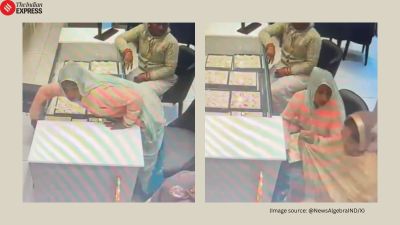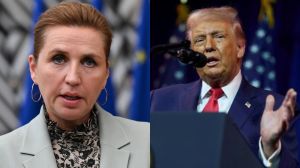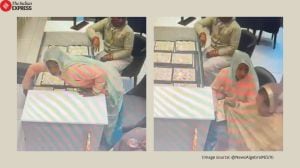Arms and the Men
Not since Bofors has the power league of arms-dealers come under such intense scrutiny. Ritu Sarin looks beyond the smokescreens and the subterfuge

Rumours, half-truths, some malicious gossip and, yes, plenty of backstories. That8217;s what you get when you delve into the murky domain of Indian arms-dealers. This month, they were back in the news when, for the first time since the Bofors years, the Central Bureau of Investigation swooped down on the biggest guns in the business.
But the subsequent silence has been deafening. Even as agency sleuths comb through trunkloads of seized documents, property papers, computer printouts, bank and credit card transactions, the raided arms-dealers themselves appear to be a sullen lot, still smarting from the crackdown. How much of this bewilderment is genuine and how much a clever facade for a quick comeback is anyone8217;s guess.
The CBI8217;s action, however, has firmed up certain facts: One, that despite their assiduous denials and legitimate business covers, the Choudhries, the Nandas and the Khannas8212;the three major arms-dealers raided by the CBI8212;remain on the top of the arms trade and of the system. Two, this clique of middlemen continues to be in charge, while small-time operators8212;like, say, Abhishek Verma currently behind bars or Mohinder Singh Sahni who was raided as well8212;pretend also to be power players. And three, only a very resolute and determined political regime can end their stranglehold over arms procurement, where commissions may run as high as 15 per cent.
Unfriendly Fire
IF one goes by the FIR filed by the CBI in the Barak missile case, the three arms-dealers are one happy family sharing the spoils of the Rs 1,125-crore deal. The FIR names Suresh Nanda, son for former Naval chief S M Nanda, as the principal broker, while Sudhir Choudhrie8212;described as Nanda8217;s 8220;relative and former business associate8221;8212;is alleged to have received 8220;millions of dollars8221; worth of remittances from the Israel Aircraft Industries IAI. Arvind Khanna, Congress MLA and son of arms dealer Vipin Khanna, is also alleged to have got 8220;suspected8221; remittances from IAI.
However, the happy family stories seem to hold little water. True, the Nandas and the Choudhries are distantly related Suresh Nanda8217;s sister Veena is married to a cousin of Rajeev and Sudhir Choudhrie. True, too, that they started off together in the arms business in the 8216;70s by launching a company, Eureka Sales, in Defence Colony. One of the first deals they struck jointly was the import of Matra missiles from France.
Soon afterwards, though, Nanda and Choudhrie fell out over money issues and parted company. Today, Nanda runs a clutch of companies such as Crown Corporation and Dynatron Services, and concentrates on the Naval sector. The Choudhrie clan8212;aided by their uncle, former Hindustan Aeronautics Limited chairman Baljeet Kapoor8212;concentrates on Air Force deals.
Nanda says the CBI came calling on his father8217;s 91st birthday, just as they were recovering from the aftermath of the early-8217;80s HDW submarine deal: The family recently got back the heirloom jewellery confiscated by the Income-Tax department over two decades ago.
Says Nanda, 8220;I have no role in the alleged pay-off to the Samata Party treasurer R K Jain. And the only remittance I have received from the IAI is Rs 2.5 lakh in 2001, for selling spare-parts for a faulty ship. The government does more damage with its flip-flops than Pakistan ever can. Because of the crackdown and the suspicions The modernisation of the defence forces will stop yet again.8221;
Curiously, while Nanda denies paying bribes for the import of Barak missiles, he admits he acted as a 8220;consultant8221; for the import of Armoured Recovery Vehicles ARVs from Slovakia8217;s Unipex, over which, too, the CBI has lodged an FIR. Both FIRs name Suresh Nanda and former Defence Minister George Fernandes as accused.
And, as if to hint at the legendary rivalry between the two families, Nanda asks one question: 8220;If both Sudhir Choudhrie and I have received money from the IAI and figure in the Barak FIR, why has he not been listed as accused?8221;
Flying the Coup
FEW realise that when the CBI raided 35 locations associated with defence dealers, Choudhrie and his family had already left the country. CBI director Vijay Shankar see interview calls this a 8220;coincidence8221; but questions are being raised on the timing of the operation, in view of the family8217;s closeness with powerful people in successive Congress regimes.
The reins of the Choudhrie family firms have been with Sudhir Choudhrie ever since elder brother Rajeev died nine years ago. Like Nanda and Vipin Khanna, he8217;s an NRI, but Choudhrie is said to claim the lion8217;s share of the defence business pie. He also enjoys diplomatic status as honorary consul general for Latvia. Interestingly, Mohinder Singh Sahni is the consul general for Belize, while Vipin Khanna represented Luxembourg till recently.
Like Nanda, who runs hotels he owns Claridges in Delhi and Sea Rock in Mumbai and an e-commerce company called CI India in his other life, Choudhrie has interests in property. He is known to have stakes in the seven-star spa Ananda in the Himalayas and several Gurgaon malls and is a director with Air Deccan.
When the CBI came knocking, it was only Choudhrie8217;s estranged sister-in-law Rita 8220;Cookie8221; to most and his mother Amrit who were in their respective homes in Sunder Nagar. Cookie Choudhrie moved out to an independent bungalow about six months ago, thus announcing the family split. When contacted, she told The Sunday Express, 8220;I have nothing to do with the family and nothing to do with all this. You know my husband passed away a long while ago; he had been ailing for two years before that. I have nothing more to add.8221;
Shot in the Foot
WHILE the immediate provocation for the CBI raids were the Barak and ARV deals, the CBI had also named Choudhrie and Vipin Khanna in its FIR in the Hand Held Thermal Imagers HHTI case lodged a year ago. Subsequently, the Khannas came under pressure as the Enforcement Directorate, during its Iraqi oil-for-food probe, uncovered their defence links.
The ED is learnt to have located dozens of off-shore companies owned by the Khannas and later tipped off the Ministry of Defence MoD on the scam. Sources say the Khannas were also found to be working with companies supplying arms to Pakistan, the reason why MoD recently instructed all its divisions to stop official dealings with the family.
It is also believed that when the Khanna kin were questioned about their arms deals, they pointed the finger at the Choudhries, saying they were only using the money transfer routes used by the grand-dads of the business for decades.
But on the Barak FIR, Vipin Khanna8217;s son Arvind is clearly on the backfoot. He maintains the only financial dealings that can link him with the IAI is a two-year 45,000-maintenance contract for the Barak missiles, signed with IAI8217;s sister concern Rafael. 8220;I have never been part of any commission arrangement for the missiles. I do have the maintenance contract for them. The agencies know that,8217;8217; he says.
Ace Up CBI Sleeve?
THE CBI, however, is hinting that they have far more on the defence dealers than is revealed by the Barak, ARV and HHTI FIRs, and says they will now use the Letter Rogatory route to get to the money trail.
But the interminable Bofors investigation and the slow progress of the Denel probe where the buzz about the Khannas8217; involvement is growing stronger has left everyone wondering what will eventually become of this bunch of transcontinental deals.
The Centre and the MoD, as usual, don8217;t have a single view on what should be done about the repeated scams involving defence middlemen. Even as the procurement bosses are known to have launched a 8216;go-slow8217; on file processing, Prime Minister Manmohan Singh has suggested rejigging the agent-registration procedures to track all those involved in specific deals.
In the pre-Bofors years, the Defence Ministry maintained a 100-strong list of defence agents. Though it was recast every year, often dramatically, the Choudhries, Nandas and Khannas always figured among the chosen few and cornered most of the business8212;as they are believed to, today. Some of these agents often figured in the CBI8217;s annual Undesirable Contact Men UCM list but, surprisingly, do not feature in the current one.
Then came the Bofors-incited ban and the 8220;undergrounding8221; of the arms business. In 2002, the MoD announced a cumbersome registration policy for defence agents. Not one signed up.
The current action against defence agents should be examined against the background of the constant official flip-flop on their status. The agents, in the meantime, have continued to manipulate General Staff Quality Requirements GSQRs and tender requirements.
Their modus operandi, insiders say, is to buy off officials in the supplier companies as well as the Indian defence establishment and8212;thanks to their NRI status and the diplomatic immunity some of them enjoy8212;launder their money abroad.
The irony is that none of the big guns has been able to resist the temptation of pumping their money back home to buy fancy property. International cooperation on tracing dirty money has become become far easier post-9/11 and, as the Volcker probe has shown, it does not take decades to get to the money trail.
It8217;s now up to the CBI and the government to take a call and cleanse the subterranean business of trading in arms.
- 0111 hours ago
- 022 hours ago
- 0311 hours ago
- 043 hours ago
- 0512 hours ago































